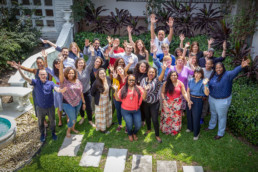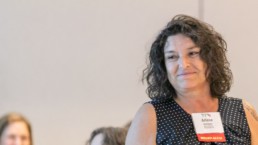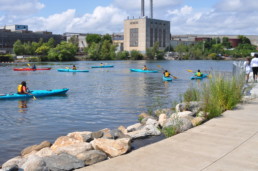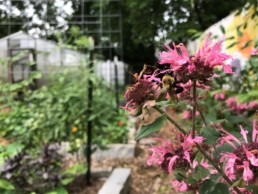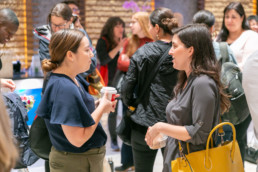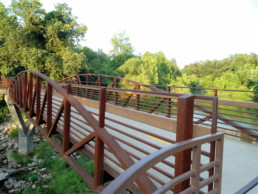2022 PLACES Fellowship Now Open!

→ Apply Now!
UPDATE: We've extended the deadline to apply for the 2022 PLACES cohort to Feb. 1. View and complete the application.
PLACES — which stands for Professionals Learning About Community, Equity and Sustainability — is a year-long learning opportunity designed to help grantmakers embed the values of racial, social and economic equity into their work.
By the end of their fellowship, participants are equipped with the tools and resources to understand, challenge and change systemic inequities.
Over the past decade, PLACES has welcomed 161 leaders in philanthropy committed to deepening their understanding of environmental, economic and racial justice. Translating those skills and knowledge into grantmaking and community engagement practices has taken on increased urgency as we navigate multiple, intersecting challenges: an escalating climate crisis, an ongoing pandemic and a widening wealth gap, all of which are causing disproportionate harm to communities of color.
By becoming a PLACES Fellow, you'll also have opportunities to connect and collaborate with peers in the sector through the PLACES Alumni Network, comprised of alums from all corners of the United States and Canada, representing national, regional, family, and community foundations as well as philanthropy serving organizations and other funding institutions.
We're so thrilled to welcome a new PLACES Fellowship cohort in 2022. Please read on for more PLACES information and highlights — and feel free to share with colleagues who may be interested!
Applications are due Feb. 1, 2022.
→ Apply Now!
About the PLACES Fellowship
The 2022 PLACES Fellowship will be a hybrid experience. The month of April will be virtual, and the three remaining sessions are tentatively planned to be in-person. Applicants will be asked to complete a short COVID-19 Comfort and Safety Survey as part of their application.
- April 20, Virtual Kickoff
- June 20-22, Burlington, Vt.
- September 19-21, Oklahoma City, Okla.
- November 14-16, San Joaquin Valley, Calif.
*Dates and locations are subject to change.
Fellowship Fees:
For accepted participants, the following fees will apply:
TFN Members: $750
Non-members: $1250
*Limited partial scholarships available.
Fees support the programmatic and operational costs associated with the fellowship, including equitable compensation for local vendors, facilitators and others involved in this work. Fellows will be responsible for travel costs and hotel accommodations for site visits.
COVID Contingencies
Given the uncertainties of the ongoing coronavirus pandemic, TFN remains committed to prioritizing the safety of our fellows and the communities they serve. We will be closely monitoring recommendations and mandates from local health officials as well as the Centers for Disease Control and Prevention as we plan for the 2022 PLACES Fellowship. Please stay tuned for updates regarding safety protocols as we will be sharing specifics about the hybrid fellowship in the coming weeks.
PLACES Impact Stories
 For the 10th anniversary of TFN's PLACES Fellowship, we worked with two award-winning journalists to help capture the stories shared and the lessons learned through the PLACES Fellowship. The result is our PLACES Impact Stories project, which includes profiles written by WLRN social justice reporter Nadege Green and videos created by documentary filmmaker Oscar Corral.
For the 10th anniversary of TFN's PLACES Fellowship, we worked with two award-winning journalists to help capture the stories shared and the lessons learned through the PLACES Fellowship. The result is our PLACES Impact Stories project, which includes profiles written by WLRN social justice reporter Nadege Green and videos created by documentary filmmaker Oscar Corral.
We asked PLACES alumni to share what inspires, motivates and challenges them in their efforts to embed the values of racial, social and economic equity into their work. Check out Surabhi Pandit's Impact story to hear more about her experiences as an alum.
Going PLACES Blogs
After each PLACES site visit, we ask the fellows to reflect on their experiences in our blog series Going PLACES. Check out some recent highlights from our PLACES alumni.
→ Going PLACES: What the Newark Rebellion can teach us about Philanthropy. By Grace Chung, Senior Community Development Officer, LISC New York City and 2019 PLACES Fellow. Read more here.
→ Going PLACES: Becoming A Change Agent. By Andrea Hulighan, Director, Strategic Initiatives, The Winston-Salem Foundation, and 2018 PLACES Fellow. Read more here.
→ Going PLACES: Wichita - Starting with difficult conversations, from a place of love. By Randy Lopez, Vice President Community Foundations, Wyandotte Health Foundation and 2018 PLACES Fellow. Read more here.
Check out the many blogs written by our fellows on the ground here.
Stay Connected
Want to stay up to date on TFN and PLACES news?


Urban Water news: How Austin is forging a path to a reliable water future (cross-post)
The Funders Network is committed to sharing the stories and strategies of our members, partners and others in the philanthropic sector working to create more sustainable, prosperous and equitable communities.
Today, we're sharing a recent blog post from the Texas Living Waters Project about Austin's effort to create a sustainable water future. The development creation and implementation of Austin's ambitious water supply plan, known as 'Water Forward', was supported through the Urban Water Initiative, a collaborative effort by The JPB Foundation and the Pisces Foundation, both TFN members. TFN managed The JPB Foundation’s portion of this grantmaking initiative. Read the full blog post by Jennifer Walker, deputy director of the Texas Coast and Water Program at National Wildlife Federation here.
Six short years ago, Austin confronted a grim water future. The long dry tail of the 2011 drought combined with record population growth and increasingly concerning climate projections to paint an anxious picture of the city’s water supply. The Highland Lakes, the sole source of water for the city, were very low and facing an uncertain future.
Yet, thanks to an all-hands-on-deck lets-do-this effort, the city rallied from those bleak months, drawing on extensive community and expert feedback to put in place the pieces that would result in an ambitious water supply plan known as Water Forward which was adopted by City Council December 2018.
This fall, key elements of that plan are finally falling into place. The city council voted in late September to enact the first significant set of ordinances to implement Water Forward. Some are the first of their kind in Texas. The ordinances stipulate:
- New developments that are required to submit a site plan will be required to prepare a water budget that will inform water management decisions on the property;
- Austin’s large commercial developments will need to offset their non-potable water use with water generated onsite—thus preserving and extending our potable water supply. Initially, this program will be voluntary and the utility will provide incentives to encourage uptake. The program will eventually become mandatory.
- Large developments will be required to connect to the centralized purple pipe system if they are within 500 feet of the line.
These programs promise to create much needed water supplies for our rapidly-growing city through drawing on locally available water supplies and utilizing it close to the source.
The value of these initiatives cannot be overstated.
Read the full post to learn more about how Austin is ahead of the state and national curve in their proactive approach to managing their water supply.
"Lake Austin" by G. Lamar is licensed under CC BY
‘A Force of Nature’: Remembering former TFN Board Chair Arlene Rodriguez
BY Tere Figueras Negrete, TFN Director of Communications
A force of nature. A bright star. A tornado in a bottle.
By all accounts, Arlene Rodriguez embodied a fierce devotion to the causes and people she cared for.
It’s with tremendous sadness that The Funders Network and our community of members, partners and staff mourn the passing of Arlene, who died earlier this month.
Arlene served on TFN’s Board of Directors from 2004 to 2011 — including a two-year term as board chair — and played an instrumental role in the creation of the network’s Smart Growth California initiative, which brings together funders from across the state to advance sustainable and equitable reforms that benefit all Californians and the communities in which they live.
“Arlene left an indelible impact on The Funders Network, not only by helping lead our organization as a board member and board chair, but through the advocacy and support that helped create Smart Growth California,” said TFN President and CEO Pat Smith. “Arlene understood the critical role philanthropy could play in driving social change and advancing environmental justice in the state, and she recognized the need for funders to come together to learn, collaborate and strategize together. We continue to be inspired by her legacy.”
Arlene’s pivotal role in helping found Smart Growth California came during her time as a senior program director at the San Francisco Foundation, where she designed and implemented the foundation’s environment program.
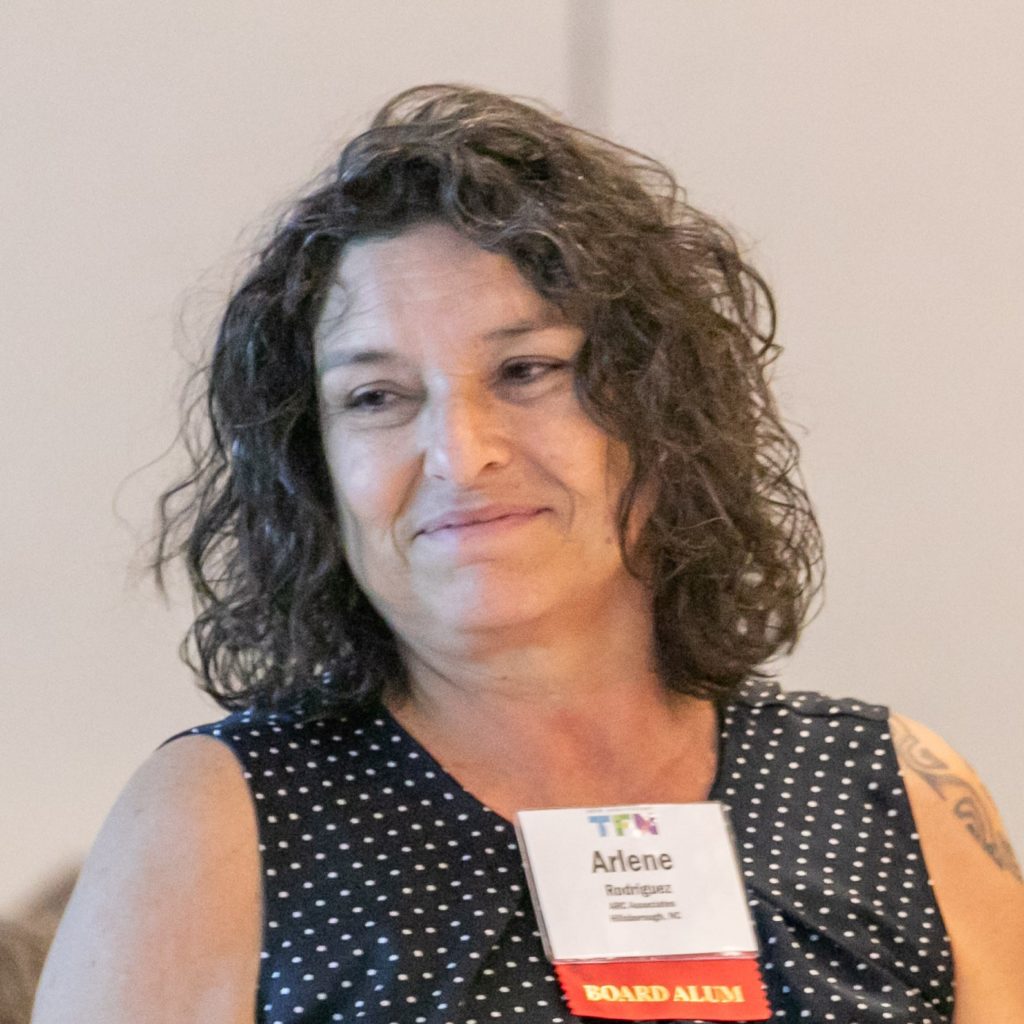 That role was one of many she held in the philanthropic and non-profit sector across decades of service and advocacy. She previously served as senior director of programs and external relations for the Gay, Lesbian and Straight Education Network. She served as director of partnerships and external affairs at Living Cities, a collaborative of 19 of the world’s largest foundations and financial institutions working to close racial income and wealth gaps in American cities. Arlene also served as the Bay Area urban program director for The Trust for Public Land, was the founding director of the Crissy Field Environmental Center during her time with the Golden Gate National Parks Conservancy, and was a senior program officer for the environment at The Gordon and Betty Moore Foundation.
That role was one of many she held in the philanthropic and non-profit sector across decades of service and advocacy. She previously served as senior director of programs and external relations for the Gay, Lesbian and Straight Education Network. She served as director of partnerships and external affairs at Living Cities, a collaborative of 19 of the world’s largest foundations and financial institutions working to close racial income and wealth gaps in American cities. Arlene also served as the Bay Area urban program director for The Trust for Public Land, was the founding director of the Crissy Field Environmental Center during her time with the Golden Gate National Parks Conservancy, and was a senior program officer for the environment at The Gordon and Betty Moore Foundation.
Arlene also served as a board member of the Jessie Smith Noyes Foundation, which makes grants to grassroots groups advancing racial justice and gender justice. She most recently was a board member of the Center for Environmental Health, which aims to protect people from toxic chemicals by working with communities, government, the private sector and others to demand and support practices that are safe for public health and the environment. (You can read CEH’s touching tribute to Arlene here.)
Arlene is survived by her wife, Ansje Miller, executive director of the Health and Environmental Funders Network, as well as her daughter, Gabriella.
Since Arlene’s passing, we’ve received many messages from past and present TFN and Smart Growth California members. We’re honored to share them with you below.
Remembering Arlene
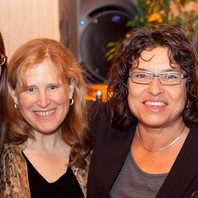
Arlene was a wonder, a deeply loving person, who was passionate about fighting for justice and making the world a better place for all. She was also a smart, strategic, and committed advocate for change, who knew how to bring people together to create new initiatives and achieve results. To me, she was also a wonderful friend, colleague, and mentor. She played an instrumental role in founding Smart Growth California while she was at the San Francisco Foundation. I will be forever grateful to her for her wise counsel, guidance, and support in launching the network. Perhaps most of all, I will remember and treasure her love of life and fun-loving spirit. She was a bright star, an inspiration, and I am very grateful to have known her.
Nina Bohlen, former director of TFN’s Smart Growth California
Arlene was a major part of Smart Growth California from its earliest days. She always had great insights as to what would work and what was fair. She had a huge heart and cared passionately for the work and advancing opportunities for all. I will always remember — and miss — her beautiful laugh and sense of humor.
Corey Brown, Resources Legacy Fund, member of Smart Growth California’s Statewide Steering Committee
I only met Arlene a few times, but every time, she left a lasting impression. I was fortunate to cross paths with her at the TFN conference in Miami where I asked her to share some of the founding stories of Smart Growth California, which she happily and energetically did. She struck me as a warm-hearted, passionate visionary who knew how to bring people together and get things done!
Ron Milam, director, Smart Growth California
Capturing the spirit of Arlene Rodriguez is like trying to put a tornado in a bottle. She was, simply put, a force of nature. Arlene was a ferocious defender of the environment a relentless advocate for social justice. But there has never been a happier warrior. Her love of mankind was eclipsed only by her love for Ansje and Gabriella. I succeeded Arlene as board chair at TFN. She and I were about evenly matched in the “bullheadedness” department, but our disagreements always ended with hugs and kisses (and martinis).
Shortly before she left us, she said “I plan to haunt you.” Technically, I suggested, she meant continue to haunt me, which drew a laugh. We should all hope to be haunted by a spirit like Arlene. We’ll be better for it.
Kevin Murphy, Berks County Community Foundation, former chair, TFN Board of Directors
Arlene lived. Arlene lived in leadership when she chaired The Funders Network board. She lived in co-parenting Gabriella to the wonderful and loving person she is. Arlene lived in love when she met Ansje Miller and flourished in that love. She also lived when she was diagnosed with cancer. Witnessing her strength, her bravery, her faith and her determination to live in the moment offered a magnificent lesson for those of us who were fortunate enough to get to know her, spend time with her and hug and love on her. I’ll miss my friend, but will be forever grateful because Arlene lived.
Scot Spencer, The Annie E. Casey Foundation, former chair and current member, TFN Board of Directors
Arlene was deeply and widely loved. And that's a testament to a life well-lived.
In my interactions with Arlene over the two decades that our paths crossed, all I can add is that she was passionate, fearless, irreverent and deeply committed to putting community first and getting the work done. Toward the end of her life, she was also increasingly reflective. To that end, I wanted to share an excerpt from a note she sent me:
‘Life — you go along thinking you are rather invincible and then bam! wake up call. Nothing is permanent, things change in an instant, presence becomes your best friend and the art of letting go comes to smack you in the face. Here I had been practicing my spiritual practice and sitting on that cushion. But dang. Now I REALLY sit on that cushion and practice letting go. Lesson. This is the moment. Take it for what really matters. Let go of the rest. 
Words to live by.
Arlene will be missed but her legacy of good works, colleagues mentored, and friends and family inspired will live on. And that's a legacy to be celebrated.
Mark Valentine, ReFrame It Consulting, member of Smart Growth California's Statewide Steering Committee
One of the most memorable meeting experiences I’ve ever had the pleasure of sharing was our 20th anniversary dinner with past TFN board members. That event was my last interaction with Arlene. Seeing her then, vibrant and engaged, and wonderfully acerbic and fun, is a great way to remember her. She was a great friend, to TFN and to all of us.
Tom Woiwode, Community Foundation for Southeast Michigan, former chair, TFN Board of Directors
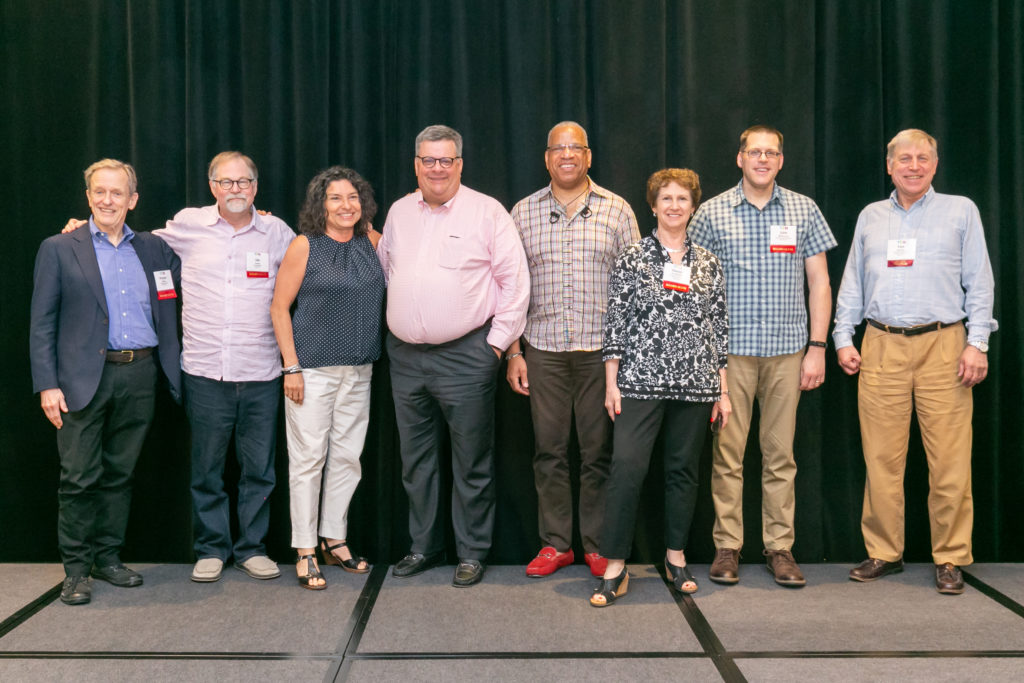
It was such a punch in the gut to hear of her passing. She was larger than life. Arlene was a real mentor to me when I started at the San Diego Foundation years ago. She also recruited me to serve on Smart Growth California's steering committee, which proved to be such a rewarding collaboration of funders across the state. She was a beautiful, passionate, and dedicated champion for a better world. May her memory be a blessing.
Emily Young, The Nonprofit Institute at the University of San Diego, formerly of The San Diego Foundation and Smart Growth California’s Statewide Steering Committee
If you'd like to contribute additional memories of Arlene Rodriguez, please reach out to TFN Communications Director Tere Figueras Negrete at tere@fundersnetwork.org
Garfield Foundation: Reflections on the Language & Practice of Systems Change
The Funders Network is committed to sharing the stories and strategies of our members, partners and others in the philanthropic sector working to create more sustainable, prosperous and equitable communities.
Today, we're sharing this two-part post from the Garfield Foundation, a TFN member, about systems thinking frameworks and collaborative network practices — and how this powerful combination can help address the complex, interconnected and systemic problems we face. (TFN's five-part Systems Transformation Learning Series, which wrapped up this summer, was made possible by support from the Garfield Foundation.)
By Jessica Conrad, Garfield Foundation
What does “systems change” mean to us? It’s a question our team often returns to after having first asked it in the early 2000s. That’s when we began experimenting with different forms of investment and collaboration grounded in systems thinking. Now, as we look back on 2020, it’s no surprise that the tone of the question has changed, gaining gravity and priority.
On the one hand, the relentless tragedies of 2020 revealed in full contrast how inequitable our systems truly are. They also raised people’s awareness about how dire the need for systems change has become on many levels — and about the systemic nature of society’s problems. One of the many stark inequities that emerged last year is the fact that, nationally, COVID-19 cases and deaths of Black, Indigenous, and People of Color exceeded their proportional share of the population. The roaring public discourse about racial injustice has made it easier for more people to connect dots between what’s currently unfolding in the public health system and the consequences of systemic racism in other realms, including the US criminal justice, public education, and economic systems, to name a few. In a word, the current landscape shows just how interconnected our issues are. At the same time, it’s exposing people to the language of system change.
Meanwhile, we are noticing a greater number of organizations in the social sector describing their approach as systemic or in service of systems change. We see many others who seek to learn about how to apply a systems approach within their work. And we also see more and more practitioners building new relationships, developing shared language, refining and diversifying practices, and sharing their experience of leading projects using systemic approaches. They are purposefully collaborating to build the emerging field of systems change practice. It seems very likely that the events of last year contributed to and accelerated these shifts in language and practice.
Yet as these dynamics unfold, we are also noticing that the terms — systems change, systemic, systems approach, et cetera — aren’t yet well defined in broad use or within the field itself. Very rarely do the words come with an explanation of their underlying assumptions, and when they do, we’ve found that people use them with different meanings in different contexts, leading to confusion.
With the language of systems change now firmly in the zeitgeist of the social sector, and growing in use in the general public, we see an opportunity to help clarify the definition and practice of systems change.
Read the full post, which includes links to the Garfield team's two-part dialogue exploring systems change, here.
"Wickerwork with shadow" by unbekannt270 is licensed under CC BY
Grant opportunity! Partners for Places Mini Grants now open
BY TFN Staff
The Funders Network (TFN), in partnership with the Urban Sustainability Directors Network, is pleased to announce a new round of Partners for Places Mini Grants.
These grants are available to help local governments, place-based foundations, and frontline community-led groups build relationships, align around project ideas, and ideally develop a proposal that centers racial equity in water, sustainability, and/or climate action work.
Partners for Places Mini Grants are designed to strengthen the relationship between the three partners in order to aid in the development of a full and jointly developed Partners for Places matching grant proposal. Applicants can receive up to $10,000 in funding, which can be used to hire experts and/or to bring together local government water and/or sustainability department leaders, local funders, and frontline community-led groups. This grant requires the hiring of an equity expert to facilitate the integration of equity principles in the collaborative partnership processes. Frontline community members may be compensated for their participation.
Download the application here.
Mini Grant applications are due Sept. 1, 2021 by 11:59 p.m. (any time zone).
A joint effort of TFN and USDN, Partners for Places is a matching grant program that improves U.S. and Canadian communities by building partnerships between local government leaders, frontline community-led groups, and place-based foundations. These sustainability efforts take place from coast to coast, in communities both large and small, and focus largely on empowering and engaging low-income neighborhoods.
To date, Partners for Places has awarded nearly $8.5 million across North America in this successful matching grant program, leading to over $18 million in investments.
The matching grant program brings national funder investors together with place-based funders to support equitable sustainable climate action and green stormwater infrastructure projects. The program is currently supported by five investor foundations: The JPB Foundation, The Kendeda Fund, The Kresge Foundation, the New York Community Trust, and the Pisces Foundation.
Want to learn more about Partners for Places?
→ Read about the most recent Partners for Places Mini Grant recipients here.
→ Meet the latest Partners for Places matching grant recipients here.
→ Where is Partners for Places making an impact? Read previous grant announcements and explore the Partners for Places Grantee Map here.
→ Where can I learn about completed Partners for Places projects? Visit the Partners for Places Idea Bank to explore what grantees are doing, learning and sharing.
→ When is the next round of Partners for Places matching grants? Partners for Places will open a new round of funding in late February 2022.
For more information about Partners for Places, please reach out to Ashley Quintana, ashley@fundersnetwork.org.
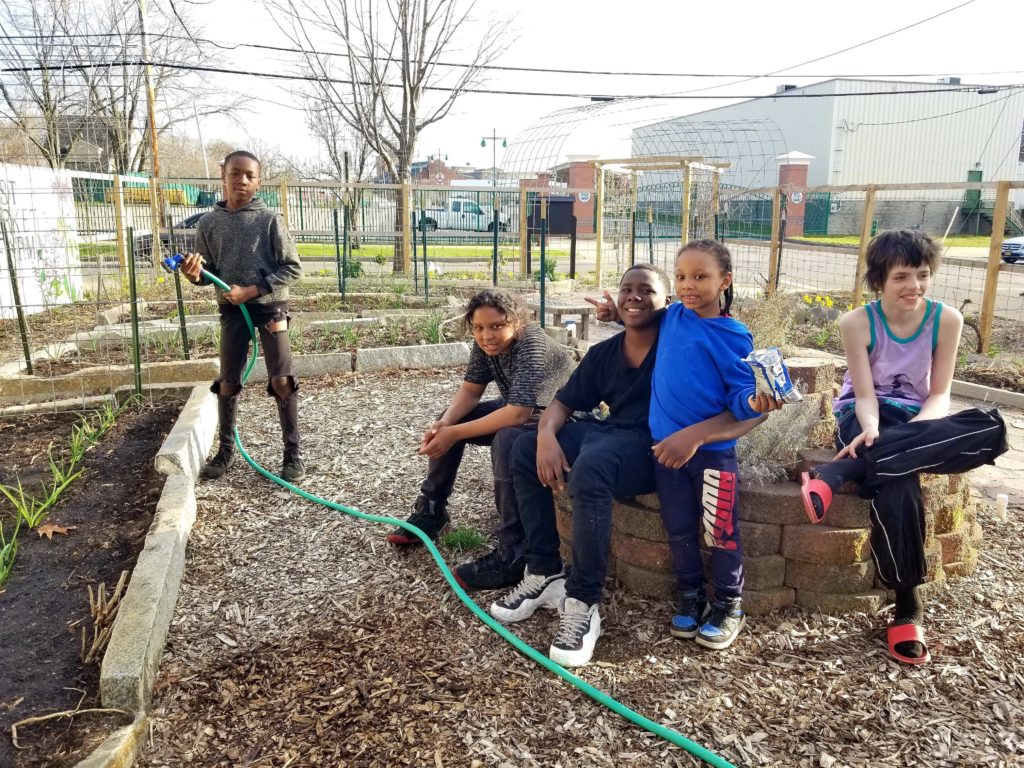
Meet the Latest Partners for Places Grantees | Six Communities Receive Grants for Community-led Sustainability Projects
BY TFN STAFF
They are turning a defunct hospital site into an urban sustainability farm and an empty field into an outdoor classroom. They are working to shield community gardens from the pressures of development. And they are striving to help underserved neighborhoods become greener, cooler and more resilient to the ravages of climate change.
The newest round of Partners for Places grantees, announced today by The Funders Network (TFN) and the Urban Sustainability Directors Network (USDN), showcases the creative and collaborative efforts happening at the local level to create equitable and sustainable communities.
In all, six U.S. communities will receive more than $380,000 in Partners for Places grants, plus matching funds from local partners, to support sustainability efforts that focus largely on advancing frontline community needs and priorities.
“These projects show how lifting up the voices of those disproportionately impacted by climate change — low-income communities and people of color — can help drive innovative, equitable approaches to complex issues,” said Pat Smith, president and CEO of TFN. “By bringing together local governments, place-based funders and frontline community-led groups, these grantees are also building relationships that will fuel even more action and collaboration at the grassroots level.”
The six communities receiving this latest round of Partners for Places grants are: Anchorage, Alaska; Boulder County and the cities of Boulder and Longmont, Col.; Chattanooga, Tenn.; Cleveland, Ohio; Richmond, Va., and Rochester, N.Y.
Meet the New Grantees!
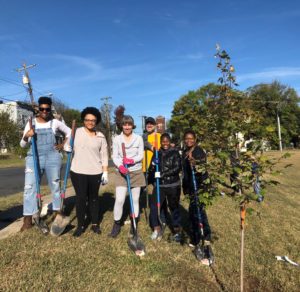
In Richmond, where decades of disinvestment and inequitable policies have created drastic climate-related inequities such as heat-related illnesses in the Southside neighborhood, Partners for Places will help fund a neighbor-led greening plan that addresses the root causes of climate injustice and restores decision-making power to Black and Latinx communities that have historically been marginalized in city planning and environmental projects.
The need to address brutal temperatures and other neighborhood issues inspired action in Chattanooga, which will use Partners for Places funding to improve the predominantly Black neighborhood of Orchard Knob – which suffers from an aging housing stock, inland flooding, and high surface temperatures due to urban heat island effect. The grant will support efforts to plant trees, transform the site of a demolished building into public green space, and make neighborhood homes safer and more energy efficient.
In Colorado, Boulder County along with the cities of Boulder and Longmont will use the matching grant to fund the formation of a climate justice collaborative that centers equity and justice to advance climate action and sustainability efforts. The frontline community member-led collaborative will create and apply a racial equity framework, shifting power structures and enacting just solutions to local climate change issues.
The Beechwood neighborhood of Rochester is home to community gardens that have transformed abandoned lots into healthy spaces, providing access to nutritious produce and instilling a sense of pride among residents. But mounting development pressures have prompted concerns that the community gardens may disappear. This Partners for Places grant will help fund physical improvements, crop planning, environmental education and youth employment opportunities. The gardens on city-owned land will also be purchased and entered into a community land trust, shielding these beloved community resources from development.
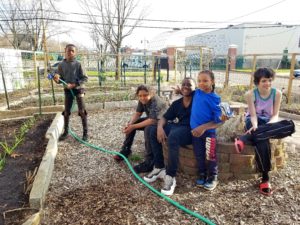
In Alaska and Ohio, new Partners for Places funding will support efforts to reimagine empty, unused spaces into gathering places that celebrate nature, connect to cultural traditions and promote community healing:
In Anchorage, the grant will be used to help turn the site of a demolished hospital into an urban sustainability farm, located within the traditional land of the Dena’ina Athabascan people, to be called the Stickleback Farm and Native Heritage Garden. The transformation will include the creation of a workforce development program for young people, increase access to local foods, provide space for mental health workshops and educate other Alaskan communities about climate resilient agriculture.
In Cleveland, Partners for Places funding will be used to turn a vacant field in the predominantly Black neighborhood of Buckeye-Woodhill into The Ubuntu Gathering Place, a vibrant outdoor space inspired by the Nguni Bantu term meaning “I am because we are.” The gathering place will feature an outdoor amphitheater, a community gathering plaza depicting the continent of Africa, and a memorial space. The project, which received a Partners for Places Green Infrastructure matching grant, will also help mitigate flooding and other water management issues by rerouting stormwater to a vegetated infiltration basin that will become the centerpiece of an outdoor classroom.
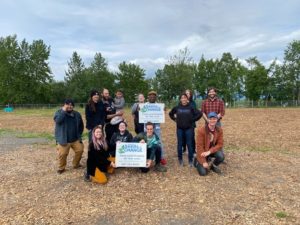
Matching Funders & Community-led Groups
The latest Partners for Places grant recipients, matching funders and frontline community-led groups are:
Anchorage, Alaska ($75,000): To convert a vacant site into tan urban sustainability farm to be called the Stickleback Farm and Native Heritage Garden that will increase access to local foods, provide additional work opportunities to homeless and at-risk populations, and provide space for mental health workshops and educational programs. Frontline community-led group: Alaska Seeds of Change, a program of Alaska Behavioral Health. Matching funder: Alaska Conservation Foundation ($75,000).
Boulder County and Cities of Boulder and Longmont, Col. ($108,000): To develop a frontline community member-led collaborative that creates and applies a racial equity framework to support just solutions to climate change. Frontline community-led groups: Community-Driven Climate Justice and Resilience Group; Equitable Climate Action Team. Matching funder: Philanthropiece Foundation ($108,000).
Chattanooga, Tenn. ($25,000): To transform the historically underserved Orchard Knob neighborhood through structural, hardscape and softscape improvements, reducing inland flooding and the urban heat island effect. Frontline community-led group: Orchard Knob Neighborhood Association. Matching funder: Community Foundation of Greater Chattanooga ($25,000).
Cleveland, Ohio. ($75,000): To transform an empty field into the Ubuntu Gathering Place, a new public park that includes green spaces for community gatherings, learning opportunities, cultural performances and more. The project will also help mitigate flooding and other water management issues by filtering stormwater to a vegetated infiltration basin that will become the centerpiece of a green infrastructure outdoor classroom. Frontline community-led and partner groups: Burten, Bell, Carr Development, Inc.; East End Neighborhood House; Western Reserve Land Conservancy. Matching funder: Saint Luke’s Foundation ($75,000).
Richmond, Va. ($25,000): To create and implement a neighbor-led greening plan that centers people who are directly impacted by climate injustice and seeks to repair decades of systemic disinvestment in South Richmond. Frontline community-led groups: Southside ReLeaf; Virginia Community Voice. Matching funder: Virginia Outdoor Foundation ($25,000).
Rochester, N.Y. ($76,425): To advance environmental justice in the Beechwood neighborhood and establish equitable city land sale policy through collaboration from government, nonprofits, and our local community foundation. Frontline community-led groups: City Roots Community Land Trust; St. Mark's & St. John's Episcopal Church; Taproot Collective. Matching funds requested from: Rochester Area Community Foundation ($76,425).
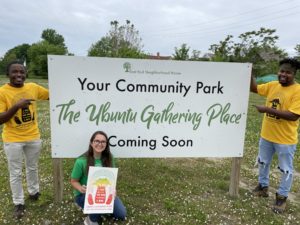
About Partners for Places
Partners for Places, led by the The Funders Network (TFN) in partnership with the Urban Sustainability Directors Network (USDN), will provide $384,425 in funding to these six communities through the grant program. With contributions from local matching funders, a total of $768,850 will be committed to fund sustainability projects in these selected communities. This grant cycle includes $75,000 — plus the local matching funds — awarded to the green stormwater infrastructure project in Cleveland. TFN and USDN have partnered with the Green Infrastructure Leadership Exchange, a practitioner network that supports communities seeking to grow green stormwater infrastructure programs, to support outreach efforts.
To date, Partners for Places has awarded nearly $8.5 million across North America in this successful matching grant program, leading to over $18 million in investments.
The matching grant program brings national funder investors together with place-based funders to support equitable sustainable climate action and green stormwater infrastructure projects. The program is currently supported by five investor foundations: The JPB Foundation, The Kendeda Fund, The Kresge Foundation, the New York Community Trust, and the Pisces Foundation.
Partners for Places FAQ's
→ Where is Partners for Places making an impact?
Read previous grant announcements and explore the Partners for Places Grantee Map here.
→ Where can I learn about completed Partners for Places projects?
Visit the Partners for Places Idea Bank to explore what grantees are doing, learning and sharing.
→ When is the next round of Partners for Places matching grants?
Partners for Places will open a new round of funding in late February 2022.
For more information about Partners for Places, please reach out to Ashley Quintana, ashley@fundersnetwork.org.
TFN 2022 Annual Conference: Call for Proposals!
BY TFN STAFF
Please note: This post was updated 7/7 to reflect the extended deadline. The new deadline for the TFN2022 Call for Proposals is July 12, 2021.
The Funders Network’s 2022 Annual Conference: Seize the Moment is scheduled to take place March 14 -16 in San Diego, California.
TFN invites you to submit a session proposal for our 2022 Annual Conference, which brings together funders from across North America to deepen learning, foster collaboration and catalyze action.
Our theme for our 2022 Annual Conference — Seize the Moment — is an opportunity to come together after more than a year of disruption to share how we can deepen our ties to the people and places we serve, deploy resources where they are most needed, and push for powerful and creative strategies to address inequities and move toward justice.
TFN’s Annual Conference brings together funders from across North America to explore the strategies and stories that are creating more equitable, sustainable, and resilient places to live.
This work has been central to our network since our inception.
But we recognize that the ongoing coronavirus pandemic, coupled with a long-overdue national reckoning on racial justice, has presented us with a singular moment in history. How can we move forward with purpose and impact? How do we meet this moment?
We will explore other questions such as:




We look forward to coming together in San Diego to delve into and lift up the work that is making an impact in these challenging and unprecedented times.
This call for session proposals is open until July 12, 2021
Submitting a Proposal
→ Read the TFN Conference Proposal Guidelines for information on review and selection criteria, session formats and more.
→ Share your proposed session via our Online Proposal Form.

Grounded in Racial Equity
Our conference planning committee and TFN team are encouraging session ideas that are interdisciplinary, cross-cutting and grounded in racial equity.
TFN recently completed a strategic planning process that centered racial equity as both cross-cutting and foundational.
TFN’s Strategic & Racial Equity Frameworks share key strategies, our racial equity framework and action plan, and program priorities. Download a copy here.
[/vc_column_text][/vc_column][/vc_row]
How can Community Development Capital Promote Health Equity in Smaller Cities? Join TFN's 6/15 Inclusive Economies webinar to learn more
BY TFN STAFF
Smaller cities present distinct opportunities, including strong entrepreneurial spirit and growth potential, to advance health equity in ways that create outsize impacts for relatively small price tags. But these small and midsize cities face many challenges in attracting and sustaining community investment capital.
Join TFN's Inclusive Economies for a June webinar that will explore the insights and lessons shared, including the challenges and promising strategies to improve community investment systems in smaller places — and the important role funders can play in supporting key partnerships and projects that advance health equity in those communities.
How Community Development Capital Can Promote Health Equity in Smaller Cities takes place on June 15 at 2:30 p.m. ET. (Register here.)
We’ll be joined by Don Hinkle-Brown, CEO of the Reinvestment Fund, a mission-driven financial institution that provides analytical tools and financing to strengthen neighborhoods, scale social enterprises, and build resilient communities. As a product of Reinvestment Fund’s Invest Health initiative, a report by Urban Institute called Making Community Development Capital Work in Small to Midsized Cities describes the challenges small and midsize cities can face in attracting and sustaining the capital needed to develop a pipeline of community development projects. From 2019 to 2020, the Reinvestment Fund convened a series of roundtables with community development investment practitioners who have financed projects that aim to improve the social determinants of health in small and mid-sized cities through community development capital.
Join us to explore the insights and lessons shared, including the challenges and promising strategies to improve community investment systems in smaller places — and the important role funders can play in supporting key partnerships and projects that advance health equity in those communities.
This webinar will also include real-world models to illustrate lessons learned in implementing strategies to improve community investment systems in smaller places with a health equity-promoting lens.
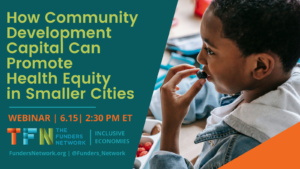
Speakers
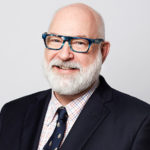
Don Hinkle-Brown, CEO, Reinvestment Fund

Raquel Favela, Senior Director, National Development Council

Brian Payne, Executive Director, CDFI Friendly Bloomington
Registration
How Community Development Capital Can Promote Health Equity in Smaller Cities
June 15 | 2:30 to 3:30 p.m. ET
Register here.
Please register for this funder-only webinar by June 11 to receive log-in information.
About TFN’s Inclusive Economies
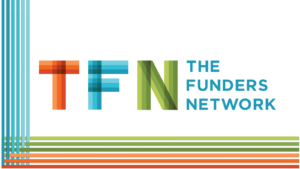 TFN’s Inclusive Economies working group brings place-based funders and related partners from across the sector together to build working relationships, advancing understanding of practices and policies that lead to inclusive prosperity and taking joint action that drives the field forward. We apply a three-part focus — race, place and prosperity — to economic growth and development.
TFN’s Inclusive Economies working group brings place-based funders and related partners from across the sector together to build working relationships, advancing understanding of practices and policies that lead to inclusive prosperity and taking joint action that drives the field forward. We apply a three-part focus — race, place and prosperity — to economic growth and development.
A particular goal is connecting people and neighborhoods of color to employment and wealth-building opportunities through investment, systems change, and policy reform.
For more information, please contact Hazel Paguaga at hazel@fundersnetwork.org.
"Athletic exercise on foot and on bicycle" by pedrosimoes7 is licensed under CC BY
Photo by Orione Conceição is licensed under CC0
How can data and storytelling bring a greenway to life? Join the Collaboration of Regional Trail Initiatives for a June 3 webinar
BY TFN STAFF
How can data and storytelling bring a greenway to life? Join the Collaboration of Regional Trail Initiatives Trail Funders Working Group for a June 3 webinar to explore just that.
Five years after cutting a ribbon on the Razorback Regional Greenway, a bold and ambitious 37-mile greenway trail system connecting all of the large communities within the Northwest Arkansas region, the greenway network and supporting culture continues to grow.
Research, surveys and trend data have all enabled public officials to advocate for sustained funding and continued growth of a cycling infrastructure and a burgeoning cycling culture. As the Walton Family Foundation launches a new five-year strategy, how do they see communities sustain this effort and build upon its success, and what lessons might they learn as they work with partners to foster greater connection and expand access to all residents in the communities?
Please join Jeremy Pate, senior program officer with the Walton Family Foundation based in Bentonville, Ark., as he leads a conversation about the tools of measurement that Northwest Arkansas has used to tell a story, compel public interest, and educate and advocate for continued funding and development of greenway trails.
RSVP
Data and Storytelling to Bring Regional Greenways to Life
Wednesday June 2, 3 to 4 p.m. ET
To RSVP for this funder-only event, please email Hannah Clemenson at hclemenson@pecpa.org
The Funders Network is a co-sponsor of this funder-only webinar presented by the Collaboration of Regional Trail Initiatives Trail Funders Working Group.
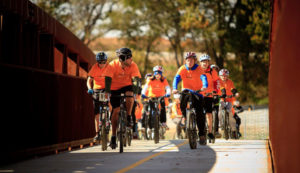
About the Collaboration of Regional Trail Initiatives
The Collaboration of Regional Trail Initiatives (CRTI) is a network of regional trail organizations born out of a desire to better understand the challenges and issues being faced regional trails groups, to learn from and share with other practitioners, and explore the potential of facing shared obstacles together by leveraging our collective visions and impacts. CRTI brings together trail visionaries from across the country. Within the group, foundation representatives meet to discuss issues related specifically to their role in furthering this work. For more information, please reach out to Hannah Clemenson, program coordinator at the Pennsylvania Environmental Council, at hclemenson@pecpa.org.
ADD COMMENT
I’m Not Just a ‘Model Minority’: Why AAPI voices are essential to the fight for justice — and how philanthropy can help
BY Jonathan Hui, The Kresge Foundation, TFN PLACES Alum
I am a first-generation immigrant from Hong Kong. Home for me is a complicated web of California, and Michigan, and Hong Kong. I am grateful for my adopted country, and every day I miss the sounds and smells of my birthplace.
And yet I was often taught that being as “American” as possible was the best — if not only — way to succeed in this country.
Speak fluent English. Learn the seventh-inning stretch. Remember that football involves touchdowns and not goals.
As I learned to assimilate, I also leaned into the stereotype of the “model minority”: the hard-working Asian overcoming all odds to achieve the American Dream. I held on to this mythic vision of myself as a way of propping myself up, something that offered validation and access white-led spaces in schools and the workplace.
What I didn’t realize, however, was that the model minority myth is just that. A myth.
It is a myth because it didn’t, and shouldn’t, define me or my community.
It is a myth because it was a stereotype created not to prop up Asian Americans, but to pit people of color against each other. The “model minority” term, coined by a white sociologist, was subsequently used by politicians to discredit the need to address racial injustices toward other peoples of color. It compares the success of Asian Americans to that of our other BIPOC brothers and sisters. It does not celebrate our achievements, but serves to imply the inferiority of others.
As we recognize Asian American and Pacific Islander (AAPI) Heritage Month this May, I invite you to celebrate and elevate the unique stories of your AAPI neighbors around the country. No two AAPI stories in the United States are the same. Each brings a complex web of family histories and life experiences that have shaped our journey in this country. Our stories embody remarkable achievement and incredible pain of real people, far beyond the one-dimensional myth of the “model minority.”
I recall the countless times I’ve been asked: “How did your English get so good?” The unspoken but clear implication being that there was something wrong with the English spoken by my fellow immigrants. And in our nation’s political discourse, we still hear stories of AAPI entrepreneurs and leaders highlighted as examples only to be asked: “If you made it, why can’t they make it?”
But this myth hasn’t translated into reality for AAPI people, including our representation in governance and business. AAPIs make up 6% of the nation’s population, but less than 1% of its elected officials at any level. In business, AAPIs make up 12% of the nation’s workforce, but only 1.5% of Fortune 500 corporate officers. Those rates are similarly appalling for our Black and brown peers in business, despite their hard-earned gains in the political sphere.
What I didn’t realize, therefore, was that my claiming the role of model minority came at the expense of my fellow AAPIs, and my Black and brown brothers and sisters. It taught me lies I internalized over time: How I prided myself at the expense of my fellow immigrants for my language fluency, or how I found myself questioning others’ success — or seeming lack of success — while being blinded by my own privilege and access to certain opportunities.
What does privilege look like for me, a member of the AAPI diaspora? My own access to education, my family’s access to wealth-building opportunities, my being welcomed into white-dominant spaces as the “model minority” have all contributed to privilege I have experienced in this country.
Indeed, I am responsible for buying into that myth, and yet am determined that I can no longer allow a myth that has perpetuated white-centeredness to reign supreme over how I view my brothers and sisters of color.
Even within the AAPI community, the model minority myth generalizes the AAPI experience. It shows our community as a monolith rather than an interconnected web of cultures, languages and peoples from hundreds of different Asian and Pacific cultures. It ignores what makes each of us human.
The response in many corners of our country to the recent murders of seven Asian women and their colleagues in Atlanta demonstrated this dehumanization. Rather than focusing on the heinous acts, commentary focused on the women’s jobs, comparing their careers to the story of the model minority. Rather than telling the stories of the women that lost their lives, we created space to somehow justify the murderer’s fetishization of Asian women. People, somehow, started asking questions of the women: “If these other Asians made it, why couldn’t they make it?”
So as we celebrate AAPI Heritage Month during the month of May, I invite you to hear the stories of your AAPI neighbors and to honor what makes each of them their own. Each story brings a different experience of immigration, of navigating the tension of cultural identity, of learning new and old languages, of food and family, of each of our intersecting identities.
And if you asked me to share my story, I would tell you about how I have to explain “where I’m from” to strangers. I would tell you about how I was determined to stay fluent in Cantonese so I can speak to my grandparents. About teaching English and civics to American high school students. About how I have come to understand my place as an Asian man living in a majority Black city like Detroit.
About how, after all these years, I am still juggling my American patriotism and Chinese cultural identity.
Mine is the story of just one person — a first-generation, Chinese, heterosexual, Christian man working in philanthropy. There are countless other AAPI experiences that deserve to be lifted up and amplified.
Who else will you invite to share their story?
Through these stories, I hope that we will find ways to celebrate what makes each of us unique. That our stories will tell of our community’s power, and hope, and complexity. That each of these stories will catalyze a shift in our culture and our policies. I hope that we will start by dismantling the dominance of white-centeredness that continues to pervade our nation — one that dehumanizes peoples of color and pits BlPOC communities against each other. I hope that I will continue to learn how I can join in a journey of shared liberation with my Black, brown and Indigenous brothers and sisters, and with the advocacy alongside our white allies, recognizing that none of us will truly experience freedom and liberation in this country unless we all do.
What Can Funders Do?
There is much we can do as funders to change the narrative of AAPI communities in our country.
1. Learn More
Read the “State of Philanthropy Among Asian Americans and Pacific Islanders,” which provides a thorough analysis of AAPIs in the nonprofit and philanthropic sector, and proposes a set of recommendations for policymakers and funders. (You can also read about another recent AAPIP study, “Seeking to Soar: Foundation Funding for Asian American & Pacific Islander Communities”, on the TFN Blog.) I would also encourage you to read this call for solidarity and collective action from Asian American/Pacific Islanders in Philanthropy, released in the wake of the Atlanta attacks.
2. Reject the Model Minority Myth
Rejecting the model minority myth opens the door for more equitable and effective policymaking and funding. Rather than seeing the AAPI experience as a prepackaged set of identities and stories, policymakers should ask the right questions to fully understand the experience of each person, and each sub-culture and subgroup.
We can start by using disaggregating data, which allows us to target interventions that support different communities within the AAPI umbrella. The percentage of Indian and Malaysian Americans with a bachelor’s degree in California (70% and 63%, respectively) is dramatically higher than those for Laotian (10%) and Samoan (12%) Americans. Poverty rates are similarly disproportionate: 42% of Hmong youth and 33% of Cambodian youth live in poverty in California, compared to between 6 and 7% of Taiwanese or Japanese youth.
We increase our understanding of the challenges faced by each sub-group as we continue to disaggregate. Think, for example, about our LGBTQIA AAPI neighbors, the elderly, or those with physical disabilities. It is only by recognizing the unique challenges faced by each subgroup that we can truly address the needs that span across the communities that make up the AAPI umbrella in the United States.
3. Recognize the Context of Place
We know that the challenges faced by AAPI communities in the San Francisco Bay Area and New York are different than those in Southeast Michigan or New Orleans. Each faces a different context of poverty and economic opportunity, housing regulations, school segregation, state and local laws that enhance or restrict access to voting, and much more. And in this era of increased violence and hate crimes toward AAPI communities, we must also recognize how the context of place shapes the safety and security experienced by our AAPI neighbors.
I hope you’ll find time to hear the stories of your AAPI neighbors, not just during AAPI Heritage Month, but year-round.
I hope you’ll honor those stories and hear within them how our shared tears of joy and sorrow have built our collective power.
I hope you’ll work alongside your AAPI colleagues to better examine how design of policies and funding programs can best address the priorities of the many communities within the AAPI family.
And I hope you’ll join us in a fight for the shared liberation of all peoples of color — of all people — as we march toward justice and opportunity in this country.
About the Author
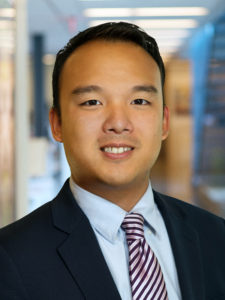 Jonathan Hui is a program officer at The Kresge Foundation, supporting the Detroit Program’s work in early childhood and neighborhood development. He joined the foundation in 2017. (Read his full bio here.) Jonathan was also a member of TFN’s 2019 PLACES Fellowship cohort, embarking on a year-long leadership development program for professionals in philanthropy to better understand issues of race, equity and inclusiveness, and recently joined the PLACES Advisory Board.
Jonathan Hui is a program officer at The Kresge Foundation, supporting the Detroit Program’s work in early childhood and neighborhood development. He joined the foundation in 2017. (Read his full bio here.) Jonathan was also a member of TFN’s 2019 PLACES Fellowship cohort, embarking on a year-long leadership development program for professionals in philanthropy to better understand issues of race, equity and inclusiveness, and recently joined the PLACES Advisory Board.
“Origami – order out of chaos” by docoverachiever is licensed under CC BY

